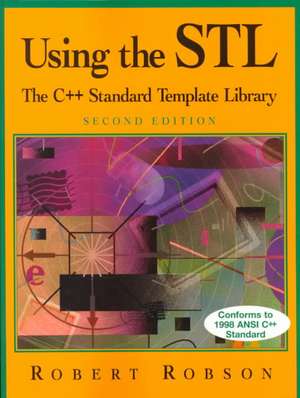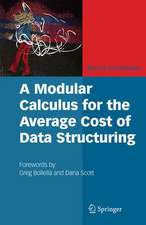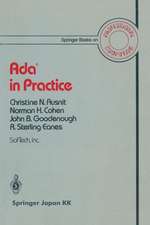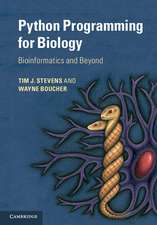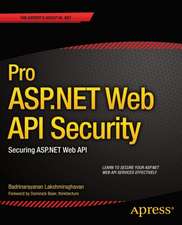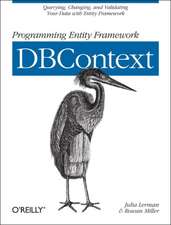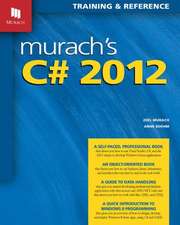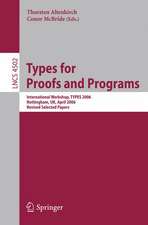Using the STL: The C++ Standard Template Library
Autor Robert Robsonen Limba Engleză Paperback – 3 dec 1999
Preț: 664.95 lei
Preț vechi: 831.19 lei
-20% Nou
Puncte Express: 997
Preț estimativ în valută:
127.28€ • 138.30$ • 106.98£
127.28€ • 138.30$ • 106.98£
Carte tipărită la comandă
Livrare economică 21 aprilie-05 mai
Preluare comenzi: 021 569.72.76
Specificații
ISBN-13: 9780387988573
ISBN-10: 0387988572
Pagini: 594
Ilustrații: XVI, 594 p. 119 illus.
Dimensiuni: 178 x 254 x 28 mm
Greutate: 0.95 kg
Ediția:2nd ed. 2000
Editura: Springer
Colecția Springer
Locul publicării:New York, NY, United States
ISBN-10: 0387988572
Pagini: 594
Ilustrații: XVI, 594 p. 119 illus.
Dimensiuni: 178 x 254 x 28 mm
Greutate: 0.95 kg
Ediția:2nd ed. 2000
Editura: Springer
Colecția Springer
Locul publicării:New York, NY, United States
Public țintă
Professional/practitionerCuprins
1 Introduction.- 1.1 What Is the STL?.- 1.2 History.- 1.3 STL Components.- 1.4 Generic Algorithms.- 1.5 Iterators.- 1.6 Standard Exceptions.- 1.7 Complexity.- 1.8 Thread Safety.- 1.9 Namespaces.- 1.10 Overview of This Book.- 2 Iterators.- 2.1 Introduction.- 2.2 Pointers as Iterators.- 2.3 Iterator Classes.- 2.4 Using Iterators.- 2.5 Iterator Functions.- 2.6 Iterator Tags.- 2.7 Iterator Traits.- 3 The STL Algorithms.- 3.1 Introduction.- 3.2 Operators.- 3.3 Function Objects.- 3.4 The STL Algorithms.- 4 Sequence Algorithms.- 4.1 Introduction.- 4.2 Preliminaries.- 4.3 Nonmutating Sequence Algorithms.- 4.4 Mutating Sequence Algorithms.- 5 Sorting and Related Algorithms.- 5.1 Introduction.- 5.2 Preliminaries.- 5.3 Sorting.- 5.4 Searching Algorithms.- 5.5 Set Algorithms.- 5.6 Heap Algorithms.- 5.7 Miscellaneous Algorithms.- 6 Generalized Numeric Algorithms.- 6.1 Introduction.- 6.2 Accumulation.- 6.3 Inner Product.- 6.4 Partial Sum.- 6.5 Adjacent Difference.- 6.6 Numeric Arrays.- 7 Sequence Containers.- 7.1 Introduction.- 7.2 Container Operations.- 7.3 Vectors.- 7.4 Lists.- 7.5 Deques.- 7.6 Choosing a Sequence Container.- 7.7 Strings.- 8 Associative Containers.- 8.1 Introduction.- 8.2 Associative Container Operations.- 8.3 Sets.- 8.4 Multisets.- 8.5 Maps.- 8.6 Associative Container Implementation.- 8.7 Hash Table Implementations.- 8.8 Container Selection.- 9 Adaptors.- 9.1 Introduction.- 9.2 Container Adaptors.- 9.3 The Stack.- 9.4 Queues.- 9.5 Priority Queues.- 9.6 Iterator Adaptors.- 9.7 Function Adaptors.- 10 Memory Management.- 10.1 Introduction.- 10.2 Allocators.- 10.3 Uninitialized Memory Operations.- 10.4 Temporary Buffers.- 10.5 auto_ptr.- 11 Putting the STL to Work.- 11.1 Introduction.- 11.2 A Banking Problem.- 11.3 Symbol Tables.- 12 The Story Continues.- 12.1 Introduction.- 12.2 The Future.- 12.3 Summary.- Appendix A STL Header Files.- Appendix B The STL Reference.- References.
